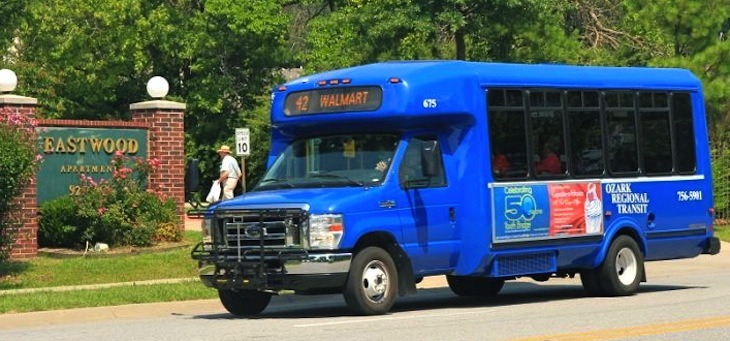Government shutdown might impact Ozark Regional Transit projects, 10-year transit plan
by January 24, 2019 4:37 pm 438 views

Without a timely end to the government shutdown, Springdale-based transit provider Ozark Regional Transit might be out of money by Independence Day. Executive Director Joel Gardner said Thursday (Jan. 24) that 48%, or $1.4 million, of the transit provider’s operating budget comes from federal funds and explained the impact of the shutdown to board members after reporting on a 10-year transit plan for Northwest Arkansas.
Gardner said one of the things he’s excited about with the work on the plan is to determine ways to be less dependent on federal funds for operations. The government shutdown might impact the schedule in the construction of a 10,000-square-foot administration office, when ORT might receive 12 new buses it ordered in September and plans to purchase four minivans for its paratransit service to replace existing ones with 250,000 miles.
Board members approved Gardner to reach out to granting agencies in and out of the area to bridge the funding gap. Funding is expected to be discussed again at the board’s next meeting March 28, if the shutdown isn’t resolved by then. The 10-year transit plan also could be impacted by the shutdown.
Work to develop the 10-year transit plan Connect Northwest Arkansas is expected to be completed in spring 2020 after multiple public meetings to gather input from residents and talks with regional transit providers and planners. Tim Simon, a transportation planner for Alliance Transportation Group of Austin, Texas, explained on Thursday the process to develop the plan to ORT board members and sought guidance on completing the plan.
Northwest Arkansas Regional Planning Commission on Dec. 21 hired Alliance Transportation Group to complete the plan. The $279,579 contract will be paid for with federal funding, and the money has yet to become available as the government is shut down. The commission receives such funding as reimbursements for expenses, said Tim Conklin, transportation program manager for the commission. Also, funding from the Federal Transit Administration that the commission distributes to ORT and Razorback Transit are accounted for similarly.
Simon said he started work on the plan Jan. 2 and is reaching out to area transit providers, including Fayetteville-based Razorback Transit, and planning organizations to determine the existing service offered in the region. He expects the public input meetings to start this spring, and they will include an education component. A final presentation of the 10-year plan is expected in spring 2020.
Work on the plan follows a four-part speaker series hosted in 2017 and 2018 by Northwest Arkansas Regional Planning Commission. The Walton Family Foundation sponsored the series and provided a nearly $80,000 grant for it. Topics of the series included the transit projects that peer regions and neighboring cities have completed, such as bus rapid transit and streetcar service.
Simon explained that the transit plan will build on the speaker series and also incorporate other recent plans, such as the report consultant KFH Group completed for ORT on a bus rapid transit study for U.S. Highway 71B, from Bentonville to Fayetteville. The consultant recommended a two-year pilot project, and a favored option had startup costs of $15.876 million and annual operating costs of $3.57 million. ORT’s 2019 budget is $3.35 million.
Simon also said he would compare numbers from existing routes, such as those in Fayetteville, which have been successful since ORT and Razorback started working together to increase the frequency and ORT stopped charging riders fares in the city. The city increased the money it gives to the transit provider to offer the fare-free service. Ridership in Fayetteville rose 43% to 32,107 passengers in the fourth quarter of 2018, from the same period in 2017, according to ORT.
The transit plan is expected to include a regional vision but with the ability to be adapted to each community, Simon said. It also will include performance measures, service standards and look at transit across all modes. He wants to dig into the numbers to determine actual costs for transit services, and he expects the final plan to include a robust technical analysis to justify its implementation to city officials. Implementing the plan will come with a cost, but he said it will show how it can be put into place slowly.
Along with the public meetings, a survey will be offered to residents to provide input. When asked about if he plans to reach out to Bentonville-based retailer Walmart, Simon said he would, and he plans to send surveys to receive input from the employees. He also might seek to receive zip codes of employees to determine from where they are coming to get to work.
When asked about light rail, Simon said he’d want to focus on improving the existing service before considering that. He explained that installing light rail before improving existing service might mean riders waiting for 60 minutes for a bus in order to reach their destination. He also said not many people are going to take three different buses to go from Bentonville to Fayetteville.
